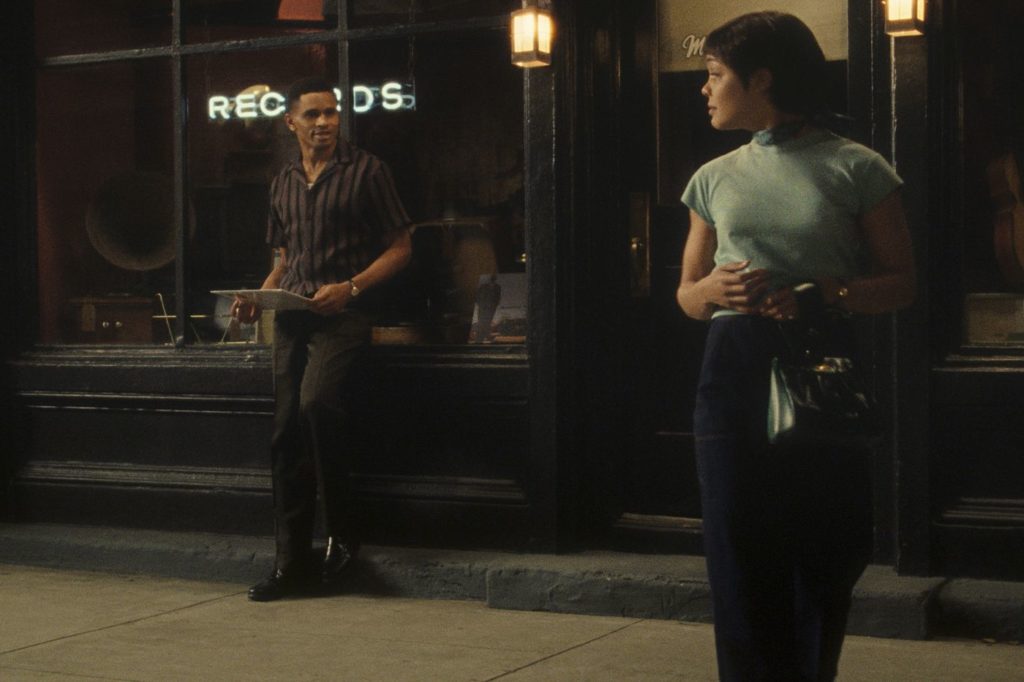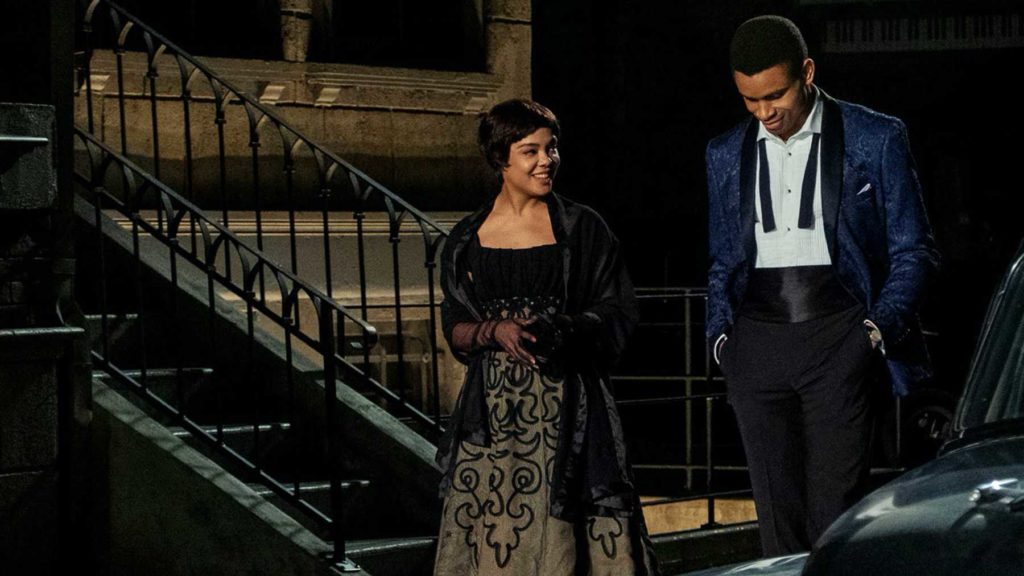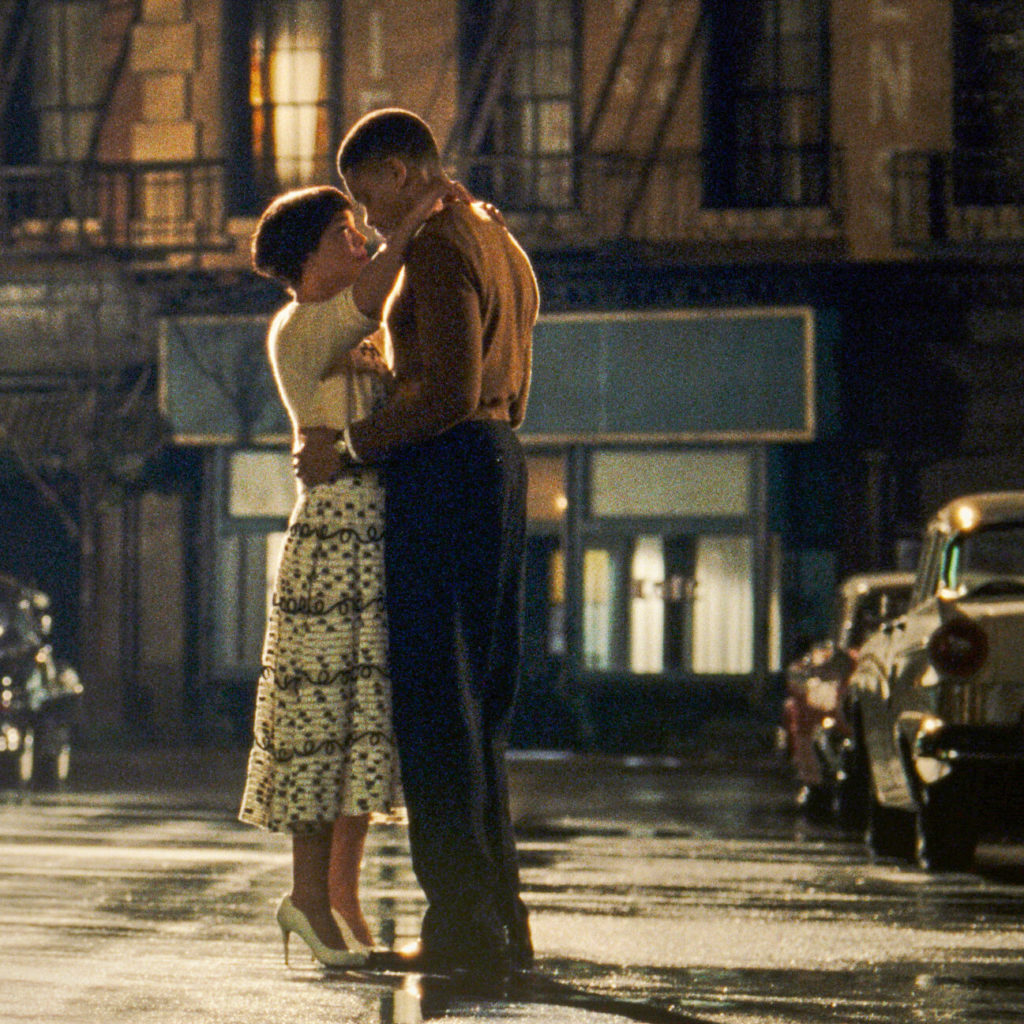
Throughout Eugene Ashe’s subtly exceptional love story, you keep waiting for what never happens. That one scene where you’re reminded that a movie about Black people must depict at least one explicitly racist encounter. It never materialized in Sylvie’s Love because Ashe consciously chose to emphasize a fullness of Black life in America that transcends the built-in obstacles everybody knows all too well about.
Set in a time that seems light years away from today, we’re taken back to 1957 to a world that feels insulated, protective and special. Harlem. Even having undergone the changes more than 60 years and ever encroaching gentrification can bring; the iconic neighborhood still retains its sense of serene singularity. It’s where Ashe grew up and a place he consciously wanted to pay homage to in his reimagined boy meets girl tale about what “extraordinary” love looks and feels like.
Tiny touches of class caress the film from beginning to end. Opening with a beautiful woman chicly dressed in blue silk while waiting in the lobby of a grand concert hall set a warm sophisticated tone for what was to come. With Nancy Wilson singing a bewitching rendition of The Nearness of You in the background, the scene establishes a soothing lushness that was to permeate throughout the project. You’d never guess that it was shot in back lots without the accoutrements we usually associate with films that feel so resplendent. Quiet, elegant and beautiful to watch, Sylvie’s Love made a habit of exceeding expectations as it drew you deeper and deeper into the lives of Sylvia Parker (Tessa Thompson) and Robert Halloway (Nnamdi Asomugha). Besides being physically arresting, bright and harboring passionate deep-seated dreams for the future, it’s their similarity in character that makes them most appealing.

The usual Hollywood formula may have been left intact; but it’s extended in small clever ways. Like any great story, its life isn’t found in what the story is about but in how it’s presented. How it reveals itself. That unveiling is what makes Sylvie’s Love unforgettable.
She’s a young woman helping her Dad out at his record store. He’s a guy just starting out and playing alto sax in a jazz band. Walking by the record shop and seeing her though a window, where he also spots a help wanted sign, he walks in only to have her gently shut down his flirtatious ploy. By quite unconsciously charming the father with his deferential respectfulness, he lands the job anyway and the story’s in flight.
The innocence and formality of the inevitable courtship recall a different time and place, too. Doubtless that kind of gallantry and nobility of restraint still goes on somewhere. In interviews, Mr. Ashe has suggested that the way the romance builds may be reflective of the relationship of his own parents. But there’s a powerful reason why this love match, despite its growing mutual attraction, should fail. As Sylvie keeps reminding her wanna be beau, she’s engaged and should be taken off the roster of potential girlfriends.

Despite being ages old, that kind of obstacle is rarely cleared with the dexterity of a track and field Olympian. Just as familiarity can breed contempt, it can also fascinate and intrigue. It can instill admiration and weaken resolve. It can make things complicated. The way Ashe develops the two characters washes away any skepticism about the veracity of this pairing. She might want to stay true to the propriety of her commitment, but the flesh has always proven notoriously weak. And what Sylvie’s Love does better than many of the movies it emulates is show that succumbing to your desires can carry lasting consequences.
The movie spans a scant five years. But because they’re transitional years, we see fundamental differences in where they find themselves in life. They’ve gotten on with the demands of living and their trajectories are beginning to solidify. She married that fiancé she talked too much about who knows their 5-year-old is not his. Robert’s jazz band dazzled Europe and now they’re a hit on both sides of the Atlantic. Their trains are traveling down completely different tracks under matching clouds of mute resignation.

We’re given a broader look at her life during those years. It’s a surface marriage where everyone plays their part with little joy. True to the times, the roles are rigid. “I don’t mind if you work outside the home as long as it doesn’t interfere with your responsibilities as a wife.” She stays close with her cousin, Mona, who’s more like the best friend anybody could hope to have. They’re a mutually beneficial pair whose high regard for one another translates into a trust that banishes judgment. Aja Naomi King shines in her role as Mona. Ashe uses her character to add political and cultural context to the times surrounding this starkly personal drama. While Sylvie’s trying to secure her foothold in television production, Mona’s passions lie in strategy and social activism. Listening to them use their brief catch-up calls to re-enforce their bond reminds you of how unique the love of lifelong friends is. It’s Mona too who provides that nudge that helps bring about the eventual resolution of this careening love affair that, in the real world as well as the fictional one, could just as easily die as survive.
Thompson, in the title role, is also getting a lot of credit for her cinematic blocking skills. Even if you’ve looked at movies your entire life, you could be excused for not having the slightest knowledge of its importance. Because it’s so pivotal to how the film looks, moves and breathes, you’d think it would rest in the exclusive domain of the director. Blocking is what makes everything you see in front of you come together “harmonically”. If done well, the entire project can be defined by its impact. Coupled with Phoenix Mellow’s remarkable wardrobe instincts, Sylvie’s Love has that kind of visual charisma that qualifies it as a beautiful story laid out on a stunning canvas.
Sylvie’s Love
Netflix